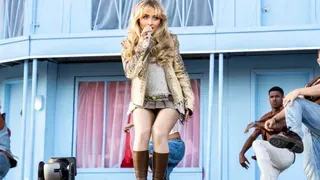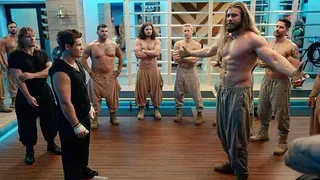November 22, 2014
'The Comeback' & 'Getting On': The Phenomenon of Female Driven Cringe Humor
Jason St. Amand READ TIME: 4 MIN.
Absolutely anything can be funny, if done right. Everything has to sort of come together, from the acting, the writing, the timing, the network, the planets aligning, for a show that's ostensibly a comedy.
HBO is airing the second seasons of two comedies this month, the long awaited return of "The Comeback" and "Getting On," which both, on paper at least, could be devastating dramas.
The former stars Lisa Kudrow as a veteran but struggling actress trying to find her footing in modern day sitcoms while filming a desperate reality show. The latter stars Laurie Metcalf ("Roseanne"), Alex Borstein ("MADtv," "Family Guy") and Niecy Nash ("Reno 911!") as three medical workers at a depressingly grey, fluorescently-lit, underfunded elderly care wing of a Los Angeles hospital. Though one show is about making it in Hollywood and the other is about death and bodily functions, these HBO programs have a lot in common when it comes to comedy: they both force you to hide behind the sheets, with one eye closed, even though you find yourself giggling.
Kudrow, who plays Valerie Cherish on "Comeback," creates a multifaceted compelling character, a complex rarity on TV. Cherish is annoying, endearing, hardworking, morally vapid, caring and lacks complete self-awareness. Kudrow is beyond phenomenal in this role; with just a single look, she's able to communicate when Cherish has been punched in the soul by a negative remark or when she's proud for doing something that makes you want to punch her in the soul.
While Cherish mostly inserts herself into awkward situations, like charging up to a showrunner's office to tell him that his script needs more puny one-liners for the footnote character she plays, the women of "Getting On" find themselves in cringe-worthy circumstances due to their positions. In the Season Two premier, "No Such Thing as Idealized Genitalia," Dawn (Borstein) and DiDi (Nash) fail at operating a new hospital bed, contorting and nearly squishing a fragile elderly woman. It's physical and silly, but you can't believe it's happening while it happens; even making you question if this sort of thing goes down in real elderly care facilities.
Both Dawn and DiDi are the heroes of "Getting On" (I find myself rooting for the selfless DiDi a bit more though), who are often up against the egotistical and ridiculous Dr. Jenna James (Metcalf), who, like Cherish, will do anything to get recognized for her work, which in this case happens to be research on feces and shrinking vaginas.
Both Cherish and James are up tight and lack the grace and understanding most of us use to get through our daily life without a second thought. They disregard their peers' feelings if it means it will get in the way of their work. And this may be up for debate, but the women's lack of understanding isn't out of malice: Cherish and James don't have the gene that tells their brain that they're doing something inappropriate and that it is not OK. This only increases the probability that these women will find themselves in a situation that forces viewers to hit 'pause' on their DVRs to catch their breath and ask themselves: "How is this happening?"
In the first episode of Season Two of "The Comeback," which is meta-upon-meta, Cherish finds herself using a college crew to film a faux reality show. She tries to show the viewers all that she's accomplished since we last saw her, which was in 2005. She plays what she calls an "indie" horror film (it's really a student film) and then a clip of her stint on a 2008 Bravo "Real Housewives" reality show, which ends up being a mess. Instead of showing a highlight, she accidentally shows the audience a huge fight where she broke the fourth wall and stormed off.
Cherish is visibly embarrassed and tries to ask one of the millennial producers to pause the laptop but, of course, she can't even remember his name, which just makes everything 100 times more awkward.
Cringe humor hasn't been done this well since Steve Carell made himself a household name by playing the ultimate boss on "The Office." Cherish, and to some extent James (she's a little too self-serious), channels Michael Scott's inability to recognize how little importance he has at his job, his big-shot-for-no-reason attitude and that, even at his worst, you can still feel bad for him. Cherish and Scott are both likable because they are goofballs and often times show bright flashes of humanity.
For Cherish, the stakes are higher - Hollywood is a cutthroat industry that doesn't favor aging women. Cherish is the underdog, an easy character to root for even at her worst. Kudrow's development of Cherish pushes the envelope since the Scott's reign over "The Office" as you watch her navigate through a world that wants nothing to do with her. She may stumble and fail, sometimes as a result of her own undoing, but she is admirable: she picks herself up, puts a smile on her face, says, "Hello, hello, hello," and pushes on as if she's on a show like "Scandal" instead of "The Mysteries of Laura."






